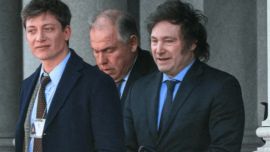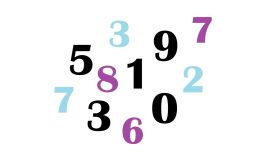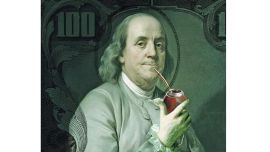Thrust into pole position for Argentina’s presidential elections, Alberto Fernández suddenly finds himself in the awkward situation of having to explain himself.
Stocks, bonds and the peso plunged on Monday after Fernández, 60, trounced President Mauricio Macri in a primary that served as a gauge of public opinion for the upcoming presidential vote. The result all but ensures Fernández’s victory on October 27, but it also put the onus on him to clarify his scant economic programme to halt the rout and ensure he doesn’t inherit a full-blown crisis.
“We’re waiting for Fernández’s first words -– whether he’ll come with a message to calm markets,” said Matías Carugati, chief economist at consulting firm Management & Fit in Buenos Aires. “We’re in a state of shock and without signals from the government about the road ahead.”
Exacerbating Fernández’s dilemma is the fact he beat Macri by criticising the government’s austerity measures and market-friendly strategy to curb inflation and boost the economy. It’s unclear how he’s going to achieve the same goals with different policies while maintaining the critical support of the International Monetary Fund.
The presence of former president Cristina Fernández de Kirchner as his running mate only increases fears that he will pivot to the interventionist policies that marked her administration. And the risk of a bumpy road until election is highlighted by Monday’s 15 percent collapse of the peso.
Fernández has so far provided few details of his economic programme, other than to repeat he won’t bring back capital controls. His team declined to answer Bloomberg’s questions on the topic Monday. His initial promises have left investors on edge: renegotiating Argentina’s record $56 billion deal with the IMF and reversing a tight monetary policy used by the central bank to fight inflation and stabilise the currency.
In a radio interview Monday morning, he put the blame of today’s markets sell-off on Macri, saying the administration created a crisis by adding too much debt.
His economic team includes Matías Kulfas, who briefly served as general manager at the central bank during part of Fernández de Kirchner’s presidency, and Guillermo Nielsen, who renegotiated Argentina’s previous IMF deal as finance secretary during Néstor Kirchner’s presidency. Kulfas said an eventual government by Fernández will have “an absolute willingness to repay” foreign debt, according to La Nacion.
In charge
While Fernández said Sunday night his party was “never crazy when governing,” investors worry his policies may look an awful lot like Fernández de Kirchner’s. During her presidency between 2007 and 2015, she nationalised pension funds, imposed currency controls and tampered with economic statistics.
Fears that power actually resides with Fernández de Kirchner stem from her outsize role in the ticket. In fact, Fernández wasn’t even in the election conversation until May, and it was Fernández de Kirchner herself who announced he was running for president. At a recent rally, voters said they were only voting for Fernández because he’s with her.
Fernández will need to “show that he – as opposed to Fernández de Kirchner – is in charge,” Siobhan Morden, head of Latin America fixed income strategy at Amherst Pierpont Securities, wrote in a note Monday. “His economic advisors are also divided between orthodox and heterodox factions.”
Election message
Meanwhile, Macri refused to throw in the towel and said he had instructed his economic team to work on unspecified measures to stabilise markets and improve Argentines’ lives.
“The election was a message; we heard it,” he told reporters at the presidential palace, without detailing any of his plans.
The president fired back at Fernández, saying he lacks credibility abroad and that Monday’s market sell-off is a sample of what would happen during his presidency.
Amongst the initial government reaction, the central bank raised interest rates back to a record 74% and sold dollars on the spot market for the first time since Guido Sandleris took the helm of the institution last year. That did little to contain the peso’s drop.
“The government would have to make a 180 degrees turn but I don’t think it will do that now,” said Sergio Berensztein, an Argentine political analyst. “Macri always said he would die with his boots on, and he is about to fulfill that prophecy.”
by Patrick Gillespie & Jorgelina do Rosario, Bloomberg




















Comments